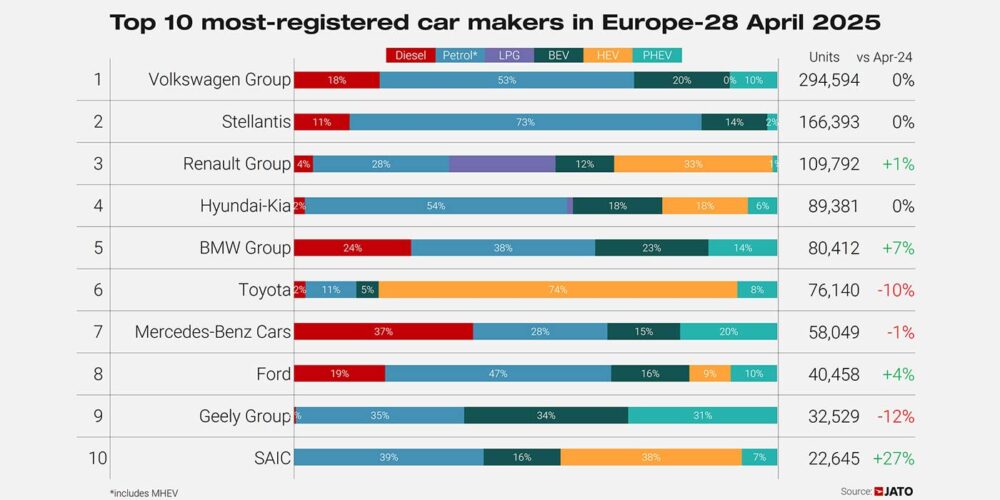According to JATO Dynamics‘ data for 28 European nations, new passenger car registrations in Europe remained stable last month. In April, a total of 1,078,521 new cars were registered—1,399 more units than in April 2024. From January through April, registrations totaled 4,467,681 units, just 6,560 more than the same period last year. The European EV market played a pivotal role in sustaining momentum, JATO said. Though internal combustion engine (ICE) vehicles saw significant declines.
“While the electric vehicle segment was a bright spot for Europe’s new passenger car market last month, these gains were offset by significant declines among ICE vehicles,” said Felipe Munoz, Global Analyst at JATO Dynamics. “EV sales need to grow much faster to have a genuine impact on the wider European car market.”
Tariffs Prompt Shift to Plug-In Hybrids
EU-imposed tariffs on electric vehicles made in China initially hurt sales for Chinese brands. In response, Chinese automakers diversified their strategies by expanding plug-in hybrid offerings. These models have not yet faced tariff measures.
“China is not only the world leader in BEVs. Its automakers are global leaders in plug-in hybrid vehicles too. To gain traction in Europe, its carmakers have responded to the threat posed by tariffs by focusing on other powertrains, such as plug-in hybrids, to maintain the momentum behind their global expansion plans,” Munoz added.

This tactical pivot enabled Chinese brands to remain competitive in the European EV market, JATO said.
Plug-In Hybrid Surge Helps Boost European EV Market Share
In April, battery electric vehicles (BEVs) and plug-in hybrid electric vehicles (PHEVs) together accounted for 26% of new car registrations in Europe—a new high. BEVs made up 17%, up from 13.4% a year prior. PHEVs reached 9%, rising from 6.9% in April 2024.
Despite tariffs, registrations of electric cars made by Chinese automakers jumped 59% year over year to nearly 15,300 units. Carmakers from Europe, Japan, Korea, and the U.S. also grew their EV sales by 26%.
Chinese manufacturers saw PHEV registrations soar by 546%, climbing from 1,493 units in April 2024 to 9,649 in April 2025. Chinese brands now account for nearly 10% of all PHEVs sold in Europe.
BYD Overtakes Tesla in Europe
April marked a turning point for the European EV market as BYD outsold Tesla for the first time. BYD registered 7,231 BEVs compared to Tesla’s 7,165.
“Although the difference between the two brands’ monthly sales totals may be small, the implications are enormous. This is a watershed moment for Europe’s car market. Particularly when you consider that Tesla has led the European BEV market for years, while BYD only officially began operations beyond Norway and the Netherlands in late 2022,” Munoz said.
Tesla saw its volumes fall 49% year over year in April, while BYD surged 359%.
Top-Selling Models Highlight European EV Market
The Renault Clio took the top spot for overall registrations with 19,000 units. Volkswagen’s Tiguan followed with 16,300 units, up 32%. Other strong performers included the Toyota Yaris Cross, Dacia Duster, Opel/Vauxhall Corsa, Peugeot 3008, Jeep Avenger, and Mini Cooper.
In the BEV segment, the Skoda Elroq led with 8,000 registrations—its first time topping the list. Three Volkswagen models followed, including the ID.7, which jumped 640% in volume. Renault sold over 5,600 units of the new Renault 5, placing it sixth among electric vehicles. Kia’s EV3 also entered the top ten.
In contrast, Tesla’s Model Y and the Volvo EX30 saw volume declines of 53% and 57%, respectively.
The post European BEV, PHEV Car Registrations Reach Record Highs appeared first on The Buzz – Electric Vehicle News.
Read the full article here



